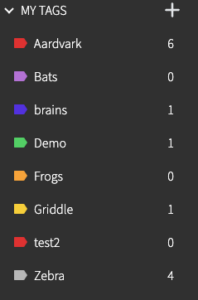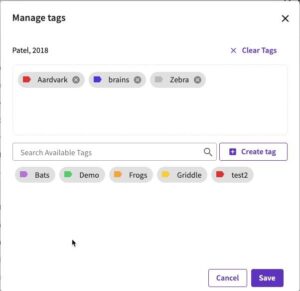How tags help you get more from your citation manager
Following the latest EndNote Web product update, the EndNote citation manager allows you to better organize your references with tags and sync across platforms. Organizing references is a critical aspect of the academic writing process and adopting a citation manager that includes a tag feature can significantly streamline this task. Tags are labels that you can customize and assign to references based on themes, topics, or any other criteria that suit your research needs. For academic researchers and graduate students writing dissertations, understanding how to effectively use tags can enhance the efficiency and quality of your work.
Here’s how tagging references can benefit the writing process:
- Simplifying reference management: Using tags to organize references allows you to categorize sources based on themes, methodologies, or relevance to different sections of your paper. This systematization makes it easier to locate and retrieve specific references when needed. For instance, you can tag sources related to your literature review separately from those used in your methodology section. This organization reduces the time spent searching for references and ensures that you can quickly access the information you need.
- Enhancing workflow efficiency: By creating a structured tagging system, you can keep track of which sources you have already reviewed, which ones you plan to use, and how each source contributes to your argument. This method helps in maintaining a clear overview of your research progress and ensures that no important source is overlooked. Additionally, it can help you identify gaps in your research, guiding you to seek out additional sources as needed.
- Facilitating collaboration: When working on collaborative projects, tagging references can be particularly beneficial. It allows all team members to understand how each source fits into the overall research framework. Shared tagging systems can help collaborators stay on the same page, ensuring consistency and coherence in the use of references. This practice also makes it easier to divide tasks, as team members can focus on specific tagged categories without duplicating efforts.
- Improving citation accuracy: Using tags can help you keep track of citation details, such as authors, publication dates, and page numbers, ensuring that you cite sources correctly. This practice not only upholds academic integrity but also enhances the credibility of your work. By tagging references with detailed citation information, you can avoid common citation errors and ensure that your bibliography is comprehensive and accurate.
- Supporting comprehensive literature reviews: A well-organized tagging system can aid in conducting thorough literature reviews. By tagging references based on their relevance to different aspects of your research question, you can ensure that you cover all necessary perspectives and avoid redundant sources. This comprehensive approach helps in building a solid foundation for your research, demonstrating a deep engagement with existing literature.
- Streamlining the writing process: With a well-organized reference system, you can easily insert citations as you write, ensuring that your arguments are well-supported by evidence. This practice can also help in maintaining a logical flow in your writing, as you can quickly reference related sources to build a cohesive narrative.
Which citation manager has the best tagging feature?
EndNote™ 21 and later versions, include a powerful tag feature that helps researchers and students organize their references more efficiently. Researchers add tags by simply selecting a reference, choosing the tagging option, and typing in their desired tag. Multiple tags can be added to a single reference, making it easy to categorize a source under various relevant themes. Tags can be customized with different names and colors, helping to distinguish between different categories at a glance.


Citation managers that sync across platforms
In the latest EndNote product update, EndNote Web now includes the tag feature which seamlessly syncs tags across both EndNote Desktop and EndNote Web. This means that any tags created or modified on one platform will automatically update on the other, ensuring reference organization is consistent and up-to-date.
Citation managers that support collaboration
When users share their EndNote library with collaborators, they can view and use the tags already created. This feature is particularly useful for collaborative projects, as it ensures that all team members are on the same page regarding the organization of references.
Adopt the tagging habit
Using tags to organize references during the writing process offers numerous benefits. It simplifies reference management, enhances workflow efficiency, facilitates collaboration, improves citation accuracy, supports comprehensive literature reviews and streamlines the writing process. Choosing a citation manager that has powerful tagging features helps academic researchers and graduate students produce well-organized, credible and impactful scholarly work.
Tag responsibly. Get started with EndNote today.